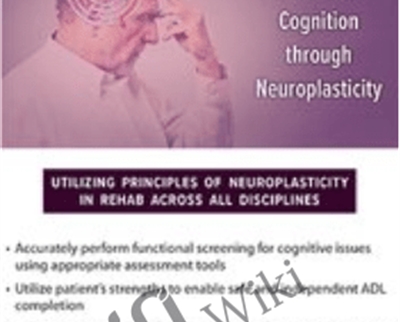Stroke Recovery Strategies: Functional Cognition through Neuroplasticity – Anysia Ensslen-Boggs
Stroke Recovery Strategies: Functional Cognition through Neuroplasticity – Anysia Ensslen-Boggs Download. Therefore, it is imperative for the rehab profess…
Overview
Discover the Best Learning with Stroke Recovery Strategies: Functional Cognition through Neuroplasticity – Anysia Ensslen-Boggs
WisMentor is your ultimate destination for online learning. Explore "Stroke Recovery Strategies: Functional Cognition through Neuroplasticity – Anysia Ensslen-Boggs" by top authors and instructors, designed to transform your skills and career. Start now and unlock your potential!
Salepage check: Stroke Recovery Strategies: Functional Cognition through Neuroplasticity
Author: Anysia Ensslen-Boggs

Stroke causes a profound impact on both patients and family members and dramatically changes all aspects of life. Cognitive deficits as a result of stroke may have a permanent impact on all activities carried out during a patient’s daily life, and lead to accelerated physical decline as well as increased falls risks. These include difficulties with attention, orientation, memory, thought organization, reasoning, and functional problem solving. Often the patient has limited or no awareness of these issues and the complications associated with them. Therefore, it is imperative for the rehab professional to be able to recognize these deficits, and to understand how they affect a patient’s overall function, completion of ADL’s, and discharge plans.
This recording will provide you with the latest evidence-based knowledge related to cognitive deficits and their impact on stroke recovery. You will learn how to apply principles of experience-dependent neuroplasticity to select and implement functional treatment objectives that help your patients to maintain and improve their current levels of function. This recording will increase your ability to apply patient-focused interventions that facilitate more independent completion of language-based ADL’s. You will learn about proper documentation of patient goals and outcomes to optimize reimbursement for skilled services provided.
- Identify various etiologies of cognitive deficits as they relate to the neuroanatomy of strokes
- Define experience-dependent neuroplasticity and its impact on rehabilitation
- Select appropriate assessments for the evaluation of cognitive deficits following stroke
- Explain how cognitive impairments impact feeding, swallowing, and ability to improve overall swallow function
- Implement treatment techniques for stroke, cognition, and falls prevention for functional improvement in ADLs
- Compose measurable goals that allow for documentation of patient outcomes
Review of Cognitive Deficits
- Stroke as Etiology
- Neuroanatomy
- Orientation & awareness
- Attention
- Memory
- High-level cognitive deficits associated with right CVA
Impact of Cognitive Deficits on Swallowing
- Feeding
- Diet changes and recommendations
- Swallowing strategies
Assessment of Cognitive Deficits Following Stroke
- SLUMS
- MOCA
- Other standardized assessments and screening tools
- Setting functional treatment objectives
Neuroplasticity
- What is neuroplasticity?
- 10 Principles of Experience-Dependent Neuroplasticity?
- Neuroplasticity and Evidence-Based Practice
- Application to Level of Assistance and Cueing Hierarchy
Interventions
- Treatment techniques for stroke, cognition, and falls prevention
- Feeding and swallowing strategies
- Cueing hierarchy and level of assistance
- Facilitating neuroplasticity to achieve functional treatment objectives
- Improving completion of ADL’s by improving cognition
- Executive Functioning and application to patient safety
- Demonstrations of cognitive interventions
Effectively Communicating with Other Disciplines
- Targeting cognitive goals in PT and OT
- Interdisciplinary treatment plans/co-treating
- Family/caregiver/staff education
- Discharge plans: Is this patient safe at home?
Documentation Tips & Tricks
- Goal-writing
- Patient outcomes
- Justifying medical necessity
- ICD-10 and Medicare Guidelines
Case Studies
- Review of case studies in small inter-disciplinary groups
- Application of knowledge
About Stroke Recovery Strategies: Functional Cognition through Neuroplasticity – Anysia Ensslen-Boggs and Our Expert Authors
Stroke Recovery Strategies: Functional Cognition through Neuroplasticity – Anysia Ensslen-Boggs is part of our extensive collection of over 70,000 premium courses at WisMentor. Created by renowned authors and industry leaders, this course is tailored to provide cutting-edge knowledge and actionable insights.
Why Choose WisMentor?
- 🌟 Access courses from world-renowned authors.
- 📚 Wide range of topics to suit your professional and personal growth needs.
- 💼 Lifetime access and flexible learning options.
Key Features of Stroke Recovery Strategies: Functional Cognition through Neuroplasticity – Anysia Ensslen-Boggs:
- ✅ Comprehensive content covering essential topics.
- ✅ Evidence-based methodologies and practical examples.
- ✅ Learn at your own pace with expert guidance.
How to Access Your Course?
Getting started is easy:
- 📩 Receive an instant download link via email.
- 🌐 Access your course anytime through your account dashboard.
- 📱 Compatible with all devices for a seamless experience.
Need Help?
Our dedicated support team is here to assist you. Visit our Contact Us page or reach out via email for any queries or assistance.
More from Our Collection:
Don’t miss the opportunity to explore more courses from top authors and enrich your learning journey at WisMentor. Find your next course now and take your skills to the next level.
